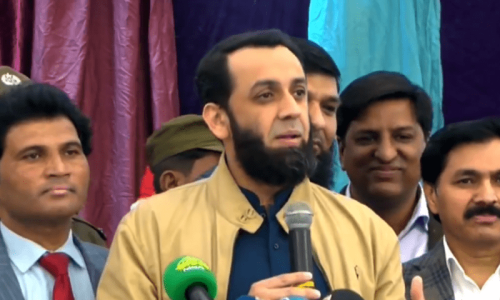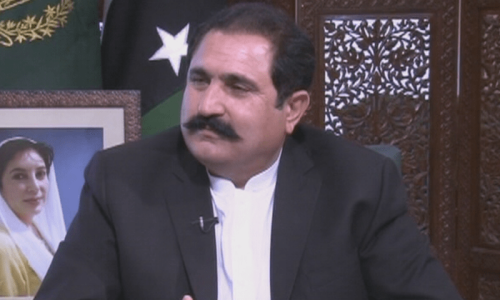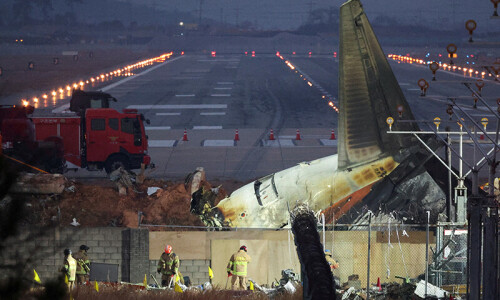LAHORE: It is a typical madressa setting: floor mats and low tables with books lying open. Children wearing skull caps sit cross-legged on the floor. The buzz of voices is broken suddenly when the teacher in the video slaps a minor child hard. The little boy who seems to only be five or six years old begins to bawl on the top of his lungs as the teacher continues his relentless thrashing of the three boys.
Most people stopped playing the video midway as the scene is too painful to watch. But for thousands of children across the country, it is a bitter reality that they must face every day of their lives.
The source of this video remains obscure. Some say it is not Pakistani, some say it is staged. However, even if it is staged, the violence, most certainly, isn’t.
It is not the first time such a video has surfaced. There are similar incidents recorded in the past where extremely cruel and inhuman treatment has been meted out to very young children -- too young to even realise anyone could be this cruel to them. Their eyes show implicit trust in an adult being broken forever.
In September 2019, Hunain Bilal, a student of Class 10, was tortured to such an extent by his teacher that he died.
According to the first information report (FIR), the teacher ‘punched him repeatedly, grabbed his hair and hit his head against the wall, shouting at him’. The teenager collapsed and could not be revived again.
In the case of Hunain, the perpetrator was arrested. But there are countless cases of physical, sexual, and psychological abuse of children at the educational institutions – both formal and informal, government and private, where culprits have impunity and are allowed to go scot-free.
The greatest hurdle in elimination of corporal punishment is the absence of any proper legal framework.
A few years ago, a case emerged through a video where children from a special education school were being physically beaten by their bus conductor.
Lawyers Miqdad Naqvi and Ahmar Majeed, who work for child rights, had filed a petition before the Lahore High Court (LHC) over the incident. The LHC banned corporal punishment in all schools but, unfortunately, that is as legal as it gets. There is also a government notification that came out under the PML-N government, advocating a motto of ‘Maar Nahi Pyar’, for children’s education. The Free and Compulsory Act Punjab is mentioned but the act isn’t notified yet and so no implementation. There is no legislation that criminalizes or even defines corporal punishment.
The Section 89 of the Pakistan Penal Code (PPC) contradicts anything that could take a step against this cruelty.
The section states that anything done ‘in good faith’ for the benefit of the children under 12 years or of unsound mind by their guardian or any other person with a lawful charge of the child is allowed. In this context, the article only provides a legal defense for corporal punishment of children.
Section 89 is a huge impediment to the cause of child protection, activists say. Though the Islamabad High Court (IHC) has already acted on a petition, filed in 2019 by Zindagi Trust founder Shehzad Roy, and has declared the colonial-era law as providing impunity to teachers and other adults, the order is meant only for the limits of the capital city.
“Technically, it (Section 89) should be repealed at once,” says Miqdad.
“The government must realise by now that if the matter of corporal punishment isn’t resolved, it would fall under child abuse and torture. And we must uphold international law.”
The UN Child Rights Convention (UNCRC), the UN Convention Against Torture (UNCAT) and several other conventions are aimed at giving the children protection.
In 2010, a Child Protection Bill referred to the interior ministry by the National Commission for Child Welfare and Development (NCCWD), included prohibition of ‘light’ corporal punishment.
A ‘Prohibition of Corporal Punishment Bill’ was laid before the parliament in 2010, which would prohibit corporal punishment in education and care settings but not by parents in the family home. This Bill was passed by the National Assembly in March 2013 but then came the election. In March 2014, a new Prohibition of Corporal Punishment Bill was laid before the National Assembly. Yet again, the Senate failed to pass the Bill. Most recently, in May 2019, MNA and chairperson SDGs Child Rights Special Committee, Mehnaz Akbar Aziz presented the Prohibition of Corporal Punishment Bill for Islamabad but ‘discussion on this bill was not allowed in the National Assembly and has been withheld for 15 months’ according to the MNA herself.
“Finally, on Aug 11, when this Bill was presented in the National Assembly for discussion and approval, the members of the ruling party opposed it and referred it to another committee,” wrote the parliamentarian.
Meanwhile, according to a statement, issued in March 2020, the Global Initiative Campaign to End All Corporal Punishment of Children no longer considers Pakistan as ‘committed to prohibiting corporal punishment without delay, as law reform in recent years has failed to achieve prohibition, and there is no evidence that the government intends to introduce such legislation in the near future’.
At present, Sindh is the only province that has actively criminalised corporal punishment but it has yet to notify the move, says Shehzad Roy.
“Mehnaz Aziz’s Bill is important and it should be passed. But at the end of the day, it is the mindset of hitting children, abuse, and the belief of the parents and teachers that it is how children should be ‘disciplined’.”
Published in Dawn, February 18th, 2021















































